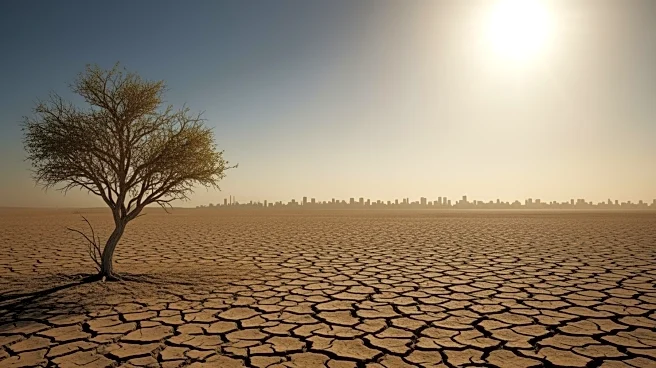What's Happening?
Iran is experiencing its worst drought in decades, prompting the government to consider drastic measures such as cutting off water supplies to Tehran and potentially evacuating the city. The drought has
severely impacted water reservoirs, with the Amir Kabir dam, a key water source for Tehran, holding significantly less water than in previous years. Energy Minister Abbas Alibadi announced that water supplies would be cut during certain times to allow reservoirs to refill, and suggested that residents install pumps to manage the reduced water pressure. President Masoud Pezehkian warned that if the drought persists without rain by December, the city’s 10 million residents might need to relocate. The government is also exploring options to import water from neighboring countries.
Why It's Important?
The drought in Iran highlights the growing global challenge of water scarcity, exacerbated by climate change. For Tehran, a city heavily reliant on its limited water resources, the situation underscores the urgent need for sustainable water management practices. The potential evacuation of millions of residents could lead to significant social and economic disruptions, not only within Iran but also in neighboring regions. This crisis serves as a stark reminder of the vulnerabilities faced by countries in arid regions and the importance of international cooperation in addressing water shortages.
What's Next?
Iranian officials are likely to continue negotiations with neighboring countries to secure water imports. Domestically, the government may implement stricter water conservation measures and invest in infrastructure to better manage existing water resources. The international community may also increase pressure on Iran to adopt more sustainable environmental policies. The situation in Tehran could prompt other countries facing similar challenges to reassess their water management strategies.
Beyond the Headlines
The drought in Iran raises ethical and humanitarian concerns, particularly regarding the potential displacement of millions of people. It also highlights the geopolitical implications of water scarcity, as countries may compete for limited resources. Long-term, this crisis could drive innovation in water conservation technologies and policies, influencing global approaches to managing natural resources.









